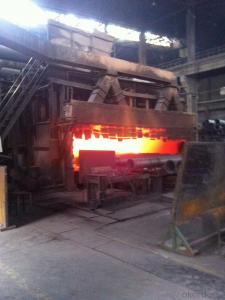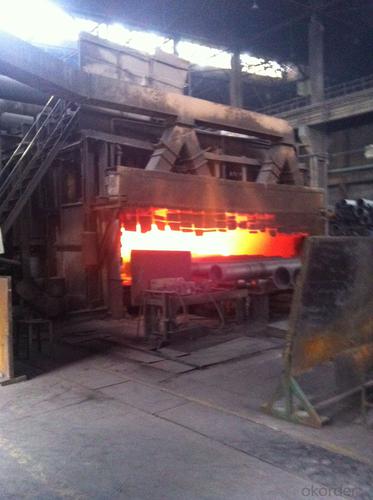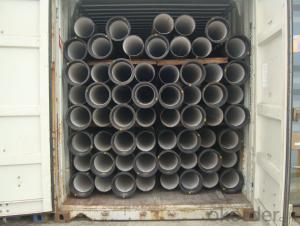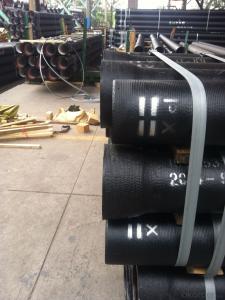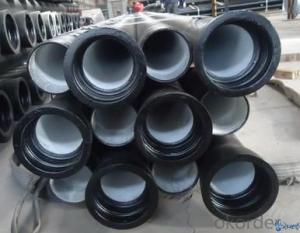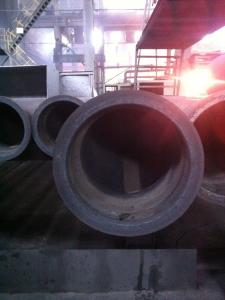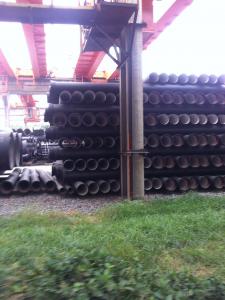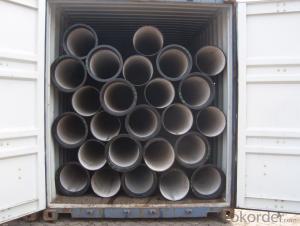DUCTILE IRON PIPE AND PIPE FITTINGS K8 CLASS DN1000
- Loading Port:
- Tianjin
- Payment Terms:
- TT OR LC
- Min Order Qty:
- 23 pc
- Supply Capability:
- 3000 pc/month
OKorder Service Pledge
OKorder Financial Service
You Might Also Like
· Material : Ductile Cast Iron
· Size Range : DN 80mm to DN 2000mm
· Unit Effective Length : 6m or 5.7m
· Manufacture Standard: ISO 2531:1998/ EN 545:2006/EN 598:2007
· Annual capacity : 200,000 tons
· Coating Exterior: Zinc 130g/m2 according to ISO 8179-1 and bitumen coating 70 microns.
· Cement Interior: Portland Cement/ High Alumina Cement/ Sulphate Resisting Cement Lining according to ISO 4179
· Special requirements on external coating and internal lining can be applied
· We also provide accessories such as SBR/EPDM rubber gaskets, lubricant paste, pipe caps, PE sleeves, etc.
Additional Parts:
Each pipe is strictly inspected according to related standard to ensure permanently high performance.
Easy Installation at site and service free for life
Long Service Lifespan
Quotation will arrive you within 24hours once we get your inquiry.
We guarantee offering you a competitive price.
A copy of original inspection reports of pipes will be offered after shipment.
Photos of loading process will be sent to the customer after shipment effect.
We will follow-up the delivery progress after shipment effect and update to the customer on weekly basis.
- Q: How do ductile iron pipes handle extreme temperatures?
- Ductile iron pipes are highly resistant to extreme temperatures. They can handle both high and low temperatures without any significant impact on their performance. This is due to the unique properties of ductile iron, including its high thermal conductivity and low thermal expansion coefficient. These characteristics allow the pipes to remain stable and durable, making them suitable for a wide range of temperature conditions.
- Q: Can ductile iron pipe be used for gas distribution systems?
- Indeed, gas distribution systems can utilize ductile iron pipe. Ductile iron, being a robust and enduring substance, exhibits resistance to corrosion, thus rendering it suitable for subterranean applications. Its capacity to endure high pressure and furnish a dependable and enduring solution has led to its widespread employment in gas distribution systems for numerous years. Moreover, ductile iron pipes are acknowledged for their pliability, facilitating simpler installation and upkeep. Nevertheless, it is imperative to guarantee conformity with the specific requirements and standards of gas distribution systems when implementing ductile iron pipes to ensure the system's safety and efficiency.
- Q: How are ductile iron pipes repaired if they get damaged?
- Ductile iron pipes are repaired in a few different ways depending on the extent of the damage. Here are some common methods for repairing ductile iron pipes: 1. Spot Repair: If the damage is minimal and localized, a spot repair can be carried out. This involves cutting out the damaged section of the pipe and replacing it with a new section. The new section is typically joined to the existing pipe using mechanical couplings or flanged connections. 2. Pipe Lining: In cases where the damage is more extensive but the pipe is still structurally sound, pipe lining can be used. This involves inserting a liner into the damaged pipe, which creates a new smooth surface. The liner can be made of various materials such as epoxy or cured-in-place pipe (CIPP). This method avoids the need for excavation and replacement of the entire pipe. 3. Pipe Bursting: For severely damaged or deteriorated pipes, pipe bursting may be the best option. This process involves pulling a new pipe through the existing damaged pipe, simultaneously fracturing the old pipe and replacing it with a new one. This method is typically used when the existing pipe is beyond repair and needs complete replacement. 4. Welding and Patching: In certain cases, small leaks or cracks in ductile iron pipes can be repaired by welding or patching. Welding involves melting and fusing the metal together to seal the damaged area. Patching, on the other hand, involves applying a specialized epoxy or composite material over the damaged section to create a watertight seal. It is important to note that the repair method used will depend on factors such as the extent of the damage, accessibility to the pipe, and the expertise of the repair crew. In all cases, proper assessment, planning, and execution are crucial to ensure a successful and long-lasting repair.
- Q: What is the cost of ductile iron pipes compared to other pipe materials?
- The price of ductile iron pipes can vary depending on a variety of factors, including size, length, and supplier. However, when compared to materials like PVC or steel, ductile iron pipes generally tend to be more expensive. This is primarily due to the manufacturing process and the inherent qualities of ductile iron that make it a durable and dependable choice for various applications. Ductile iron pipes are renowned for their high tensile strength, resistance to corrosion, and durability. These qualities make them suitable for transporting potable water, wastewater, and other fluids under high pressure. The production process for ductile iron involves the addition of magnesium to cast iron, resulting in improved strength and flexibility. This additional step, combined with the quality of the material, contributes to the higher cost. On the other hand, pipes made from materials such as PVC or steel can be less costly. PVC pipes are lightweight, easy to install, and relatively inexpensive, making them a popular choice for low-pressure applications like irrigation or drainage systems. Steel pipes, known for their strength and durability, are often used in high-pressure situations but come with a higher price tag than PVC. In the end, while ductile iron pipes may have a higher initial cost, their longer lifespan and reliability can make up for the investment over time. Other factors, such as project requirements, local regulations, and material availability, can also impact the overall cost comparison between ductile iron pipes and other pipe materials.
- Q: Does the cast iron pipe need separate corrosion protection?
- No, the inner and outer corrosion protection of the tube has been done.
- Q: Can ductile iron pipes be used in contaminated groundwater systems?
- Yes, ductile iron pipes can be used in contaminated groundwater systems. Ductile iron pipes are known for their high strength and durability, making them suitable for various applications including water and wastewater systems. They have corrosion resistance properties that protect against internal and external corrosion, making them a reliable choice for transporting water, even in contaminated groundwater systems. When dealing with contaminated groundwater, it is essential to consider the level and type of contamination present. Ductile iron pipes are resistant to many common chemicals found in groundwater, such as certain acids and alkalis. However, in cases of severe or specific chemical contamination, it may be necessary to consider alternative pipe materials that offer better resistance to those specific substances. Furthermore, proper installation and maintenance practices are crucial to ensure the long-term performance of ductile iron pipes in contaminated groundwater systems. Regular inspections, cleaning, and the use of appropriate protective coatings can help mitigate any potential risks associated with contamination. Overall, ductile iron pipes can be effectively used in contaminated groundwater systems, provided the level and type of contamination are within acceptable limits and proper installation and maintenance practices are followed. It is always recommended to consult with experts and consider local regulations and guidelines when making decisions regarding the suitability of pipe materials in specific groundwater systems.
- Q: What are the common methods for flow control in ductile iron pipes?
- Ductile iron pipes offer various options for flow control. Among them, valves are commonly used. Valves enable the regulation of water or other fluids flowing through the pipes. They can be either manually operated or automated, depending on the system's specific needs. Flow restrictors or flow limiters represent another method for controlling flow in ductile iron pipes. These devices are installed in the pipes to reduce the flow rate and ensure that the system operates within its intended parameters. Flow restrictors are particularly beneficial in situations where flow control is necessary to prevent damage or optimize system efficiency. Pressure regulators also contribute to flow control in ductile iron pipes. By maintaining a specific pressure level within the system, these devices help prevent excessive pressure that can lead to pipe bursts or other forms of damage. Furthermore, pressure regulators aid in maintaining a consistent pressure throughout the system, ensuring predictable and controlled flow. Flow meters provide yet another means of achieving flow control. These devices are installed in the pipes to measure the rate at which fluid passes through them. By monitoring the flow rate, operators can adjust valves or other flow control devices to maintain flow within the desired range. Flow meters are especially valuable in applications where accurate flow measurement is critical, such as industrial processes or water distribution systems. In conclusion, flow control in ductile iron pipes can be achieved through the use of valves, flow restrictors, pressure regulators, and flow meters. These methods can be combined or used individually, depending on the specific requirements of the system.
- Q: How are leaks repaired in ductile iron pipe?
- Leak repairs in ductile iron pipes are typically carried out using various methods depending on the severity and location of the leak. One commonly used technique is the application of epoxy-based sealants or leak repair clamps. For small leaks, epoxy sealants are commonly used. This involves applying a specialized epoxy compound to the leaking area, which then hardens and forms a durable seal over the leak. The epoxy is carefully applied to the surface of the pipe, covering the leakage point and any surrounding damaged areas. This method is effective for small leaks and can provide a long-lasting solution. In cases where the leak is larger or more severe, leak repair clamps are often employed. These clamps are designed to provide a mechanical seal over the leak, using rubber gaskets and bolts to secure the clamp tightly around the pipe. The pressure from the clamp compresses the gasket onto the pipe, creating a watertight seal and preventing further leakage. Leak repair clamps are available in various sizes to accommodate different pipe diameters. In both cases, it is crucial to properly prepare the pipe surface before applying the repair method. The area around the leak must be cleaned and dried thoroughly to ensure good adhesion of the epoxy or proper sealing with the clamp. Additionally, it is essential to follow the manufacturer's instructions and guidelines for the chosen repair method to ensure a successful and long-lasting repair. It is important to note that these repair methods are temporary solutions and may not be suitable for all situations. In some cases, particularly for extensive pipe damage or aging infrastructure, it may be necessary to replace the affected pipe section entirely. Professional assessment and guidance from qualified technicians or plumbers are recommended when dealing with leaks in ductile iron pipes to ensure proper repairs and minimize the risk of future issues.
- Q: What are the different lining materials available for ductile iron pipe?
- Ductile iron pipes have multiple options for lining materials, which serve to safeguard the pipes from corrosion and prolong their lifespan. Some commonly used lining materials are as follows: 1. Cement Mortar Lining: This lining comprises a layer of cement mortar applied to the inner surface of the pipe. It serves as a durable and smooth barrier against corrosion, making it a popular choice for water and wastewater applications. 2. Polyethylene Encasement: In this method, the pipe is wrapped with a layer of polyethylene film. This lining delivers excellent protection against corrosion and is frequently employed in aggressive soil conditions. 3. Polyurethane Lining: Polyurethane lining is a spray-applied substance that forms a seamless and flexible barrier within the pipe. It offers exceptional resistance to chemicals and abrasion, making it suitable for applications involving aggressive fluids. 4. Epoxy Lining: Epoxy lining is widely chosen for lining ductile iron pipes due to its outstanding resistance to corrosion and chemicals. It is typically applied as a liquid coating that cures to form a protective and smooth layer. 5. Zinc Coating: Zinc coating, also known as galvanizing, involves applying a layer of zinc to the external surface of the pipe. This lining provides corrosion resistance and is commonly utilized in outdoor and exposed applications. These diverse lining materials offer distinct advantages and are selected based on the specific requirements of the application. Factors such as the nature of the transported fluid, environmental conditions, and expected service life play a crucial role in determining the most suitable lining material for ductile iron pipes.
- Q: What is the typical lifespan of ductile iron pipes?
- The typical lifespan of ductile iron pipes can vary depending on various factors such as the quality of the pipes, the environmental conditions, and the maintenance practices. However, on average, ductile iron pipes have a lifespan of around 75 to 100 years. This makes them a durable and long-lasting option for water and sewage transportation systems. With proper installation and regular maintenance, these pipes can withstand corrosion, pressure, and other external factors, ensuring their longevity and reliability. Additionally, advancements in coatings and linings have further enhanced the lifespan of ductile iron pipes, making them an excellent choice for infrastructural projects.
Send your message to us
DUCTILE IRON PIPE AND PIPE FITTINGS K8 CLASS DN1000
- Loading Port:
- Tianjin
- Payment Terms:
- TT OR LC
- Min Order Qty:
- 23 pc
- Supply Capability:
- 3000 pc/month
OKorder Service Pledge
OKorder Financial Service
Similar products
Hot products
Hot Searches
Related keywords
